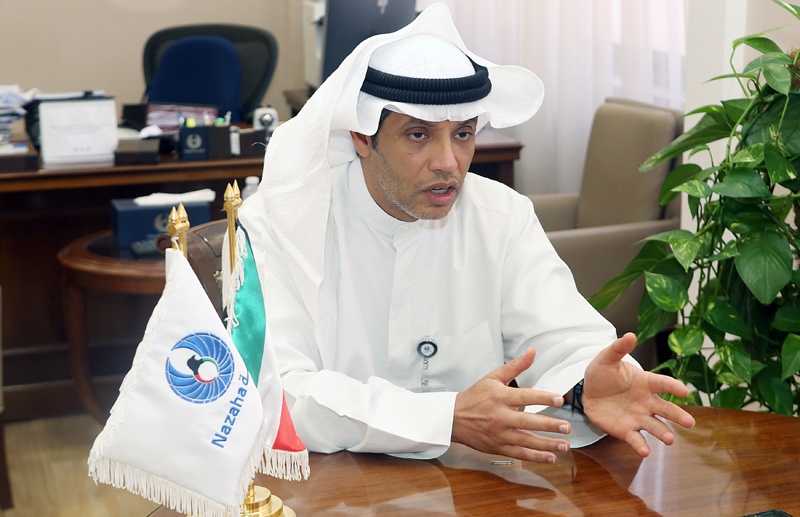
By Nawara Fattahova
KUWAIT: During the past few years, corruption has become one of the most discussed topics in Kuwait. Due to the increasing number of graft cases, the Kuwait Anti-Corruption Authority (Nazaha) was established four years ago according to law no. 2/2016.
"Over 300 reports of corruption have been made to Nazaha since 2016, and 40 were referred to the public prosecution. Out of these, seven final verdicts have been issued, while the rest are still in court. The final verdicts stipulated financial penalties, in addition to forcing those convicted to return double the amount of funds misappropriated," Dr Mohammed Buzubar, Assistant Secretary General for Detection and Investigation at Nazaha, told Kuwait Times.
"Nazaha only accepts reports of corruption by employees in the public sector in positions starting from manager till the prime minister, according to article 2 of law no. 2/2016. These include around 40,000 positions. Exceptions can be made if misappropriated amounts are very large, but usually the public prosecution deals directly with those in lower positions. Article 22 of the same law also mentions the crimes to which it applies," he added.
"Nazaha was founded based on the United Nations Convention Against Corruption (UNCAC), which today has 187 members. Becoming a member in this convention resulted in making a commitment to establish relationships with all international organizations including UN and European organizations such as the Financial Action Task Force (FATF) and others. Nazaha is in regular contact with them in order to combat corruption crimes," Buzubar pointed out.
Nazaha has close relations with these organizations. "We are cooperating with them in various issues. UNCAC sets a review every five years of the commitments of each member. We also have very close relations with the United Nations Office on Drugs and Crime (UNODC). We exchange information with other members, which helps us when searching for information outside our borders. We have many examples of such cooperation," stated Buzubar.
Community role
Nazaha also plays an awareness role in the community. "According to the convention, it is part of our duty to have channels of communication with non-governmental organizations, as these institutions usually are the ones to detect corruption. So Nazaha cooperates with NGOs and supports them," he said.
"We also hold symposiums and workshops with them to spread awareness on the dangers of corruption. On Monday (Sept 21), we are holding a workshop titled 'Democratic Labor Governance'. Participation in this workshop is open to the public," Buzubar told told Kuwait Times. "Furthermore, we have various memorandums of understanding with different public institutions including the ministry of awqaf, ministry of youth, ministry of education, ministry of commerce and others."
Financial disclosures were mandated by the anti-corruption law, according to which a person discloses all their real and movable property within the legal period, whether they are working in a public position or have left this position. The disclosure includes their bank accounts, real estate, movable property, debts and others. "This disclosure helps us in controlling the performance of the public employee, so he cannot illegally benefit or profit from his public position. We are able to control his illegally inflated bank accounts. If an accusation is proven, we will refer him to the prosecution," stressed Buzubar.
"The national strategy for combating corruption is our long-term project. This strategy is a roadmap for the cooperation of the community with Nazaha in combating corruption. Nazaha leads this effort and the community supports it. This strategy was set for the period from 2019 to 2024, and it includes priorities and activities addressed to all public institutions, which have to respond to us," he noted.
"The duties of the institutions may include addressing any missing legislation at an institution, so it has to issue a decree. If the institution is holding training courses for employees, it has to inform us. Also, all public institutions should have codes of conduct and codes of ethics," Buzubar said.
Whistleblowers protection
Nazaha provides protection to whistleblowers. "There are three types of protection - personal, administrative and legal. Currently, we are providing administrative and legal protection, which guarantees the whistleblower anonymity and their personal data are confidential during investigations at Nazaha and outside it (at the prosecution), in case the whistleblower faces problems or abuse at their workplace related to reporting corruption," highlighted Buzubar.
A whistleblower has to submit proof. "He should have some documents proving his statement, or at least he should inform us where we can find such documents. We have the legal authority to get any document we need from any public institution to use for our investigations at Nazaha," he told Kuwait Times.
The law sets sanctions for malicious reports, but they haven't been activated till now. "Sanctions for false or malicious reports are mentioned in the corruption law, but until today, Nazaha hasn't imposed any sanction as we assume the goodwill of the whistleblowers. But sanctions are included in the law to protect persons accused of corruption if they are innocent," concluded Buzubar.










